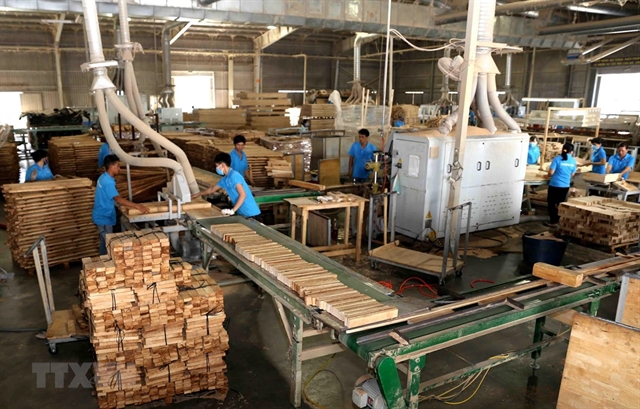Viet Nam’s wood export turnover this year would reach the record high level of nearly US$12.5 billion despite impacts of the COVID-19 pandemic as well as risks from export markets and the country’s policy changes in controlling the legality of imported wood materials.

Viet Nam’s wood export turnover this year is expected to reach a record high of nearly US$12.5 billion despite impacts of the COVID-19 pandemic as well as risks from export markets and the country’s policy changes in controlling the legality of imported wood materials.
Chairman of the Viet Nam Timber and Forest Product Association (VIFOREST), Do Xuan Lap, made the statement at a conference held online both in Ha Noi and HCM City on Monday.
Lap said the wood sector was confident of achieving the target thanks to a surge in the product’s exports, especially in the second and third quarter of the year. In the first 11 months of 2020, the wood sector’s export turnover reached more than $11 billion, representing a 15.6 per cent year-on-year increase.
The Government said the wood industry has been one of the leading sectors contributing to the increase of export turnover of the country’s agro-forestry products.
Relating to risks from export markets, Viet Nam’s wood industry is facing trade tensions among big countries around the world.
The local industry has faced anti-dumping lawsuits from the US and South Korea, specifically for plywood related to commercial fraud and tax evasion. Plywood is not the only item. There are still a number of Viet Nam’s export products with great risks in the future, he said.
Most recently, the US Trade Representative accused the Vietnamese timber industry of using illegal timber in the domestic market and in products exported to the country. The risk that the US Government applies trade restrictions on these Vietnamese timber could be very high.
The chairman added that Viet Nam has changed policies as it promulgated the decree on Viet Nam Timber Legality Assurance System (VNTLAS). The decree regulates the harvest, transportation, trade, and processing of timber in accordance with requirements and regulations of international conventions that Viet Nam is party to and requirements of countries that import processed wooden products from Viet Nam.
The Ministry of Agriculture and Rural Development (MARD) issued a decision on a geographic origin and timber species risk category. This plays an important role in controlling the legality of imported timber.
Phung Gia Duc, deputy head of the Foreign Trade Defence Handling Division under the Ministry of Industry and Trade’s Department of Trade Defence said Viet Nam has faced a total of 199 cases so far. In the past five years, there were 97 commercial defence investigations. The most surveyed markets are the US, India, Turkey, Australia, Canada, the EU and the Philippines. In 2020, Viet Nam is under investigation in a total of 37 cases. The investigations were related to tax evasion on plywood products and anti-dumping for MDF wood.
To avoid anti-dumping and anti-tax evasion investigations, Duc said that local businesses need to have knowledge about trade defence. They must understand the true nature of this tool in order to have the right responses. When exporting to a certain market, they should have information from importers. As soon as information about anti-dumping investigations is available, businesses must take action to respond. The ministry will issue warnings to support businesses. In addition, it is necessary to have controls on the value and volume of exports to that market to get the lowest tax rate.
“Information is extremely important. Getting the information early will solve many problems. Currently the Ministry of Industry and Trade has an early warning mechanism. In the last two quarters, we continuously update wood products that are at risk of being sued,” he added.
Phan Mai Quynh from the Self-Defence and Damage Investigation Department said before any incident occurs, exporters need to update the early warning list of the Trade Defence Department; and find out about the trade defence regulations of the investigating country. Meanwhile, they were asked to diversify their products, focus on high quality products and promote market diversification.
“It is necessary to monitor the goods imported into Viet Nam, and at the same time use trade remedies to protect the domestic manufacturing industry. If there is a careful preparation, it will overcome the barriers of anti-dumping investigation from other countries,” she added.
The conference provided exporters and producers with trade defence skills, issues related to commercial fraud in import and export activities, goods origin fraud to reduce risks in their trading. — VNS





